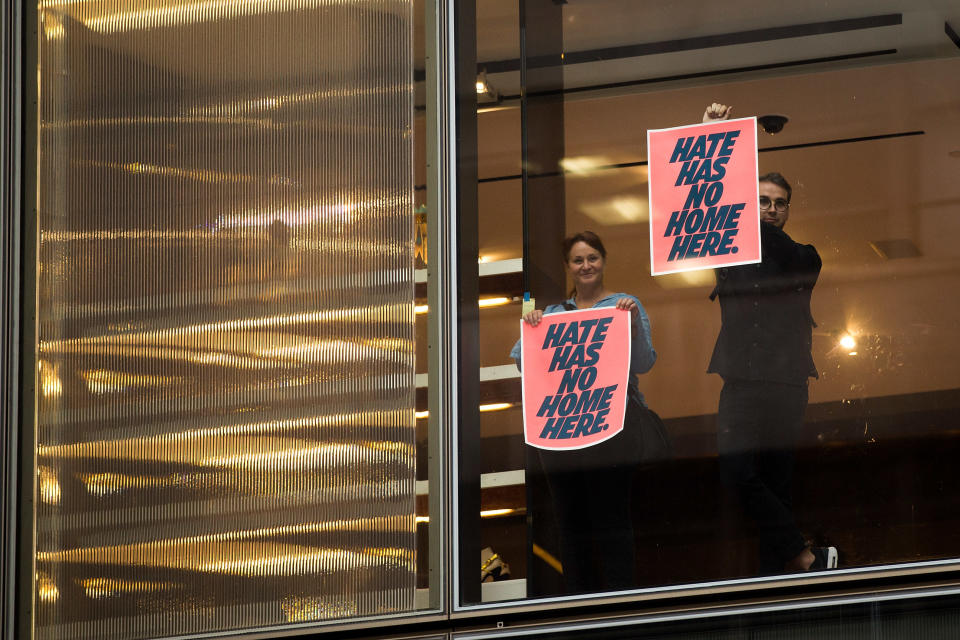White House Official Struggles To Defend Graham-Cassidy Bill's Preexisting Conditions Loophole
A top Trump administration official ended up conceding on Sunday that individuals with pre-existing medical conditions might end up with higher premiums under the latest effort by Senate Republicans to repeal the Affordable Care Act.
On “Fox News Sunday,” host Chris Wallace pressed White House director of legislative affairs Marc Short about a provision in the GOP repeal bill that would allow states to seek a waiver from rules barring insurers from charging people with pre-existing conditions higher premiums.
Short defended the provision ― referred to by Wallace as a “loophole” ― by saying Republicans do not want “Washington, D.C., choosing all the rates across the nation for all sorts of factors.”
The health care bill, proposed by Sens. Lindsey Graham of South Carolina and Bill Cassidy of Louisiana, has been enthusiastically embraced by President Donald Trump but appears to face long odds of passing.
The Affordable Care Act ― known as Obamacare ― forced insurers to cover people in the individual insurance market who have illnesses or other medical conditions that qualify as “pre-existing.” It also mandated that insurers adhere to “community rating” guidelines when setting premiums, charging the same rates for an entire region, rather than charging people with pre-existing conditions more or otherwise differentiating between customers based on medical histories.
The Graham-Cassidy bill preserves the first of these regulations, known as “guaranteed issue.” But it allows states to seek a waiver from federal “community rating” provisions so long as it is shown that “adequate and affordable” coverage is available to people.
Wallace insisted that without a clearer definition of “adequate and affordable” coverage, the White House and congressional Republicans were opening the door for people with pre-existing conditions to pay significantly more in premiums because of their health histories.
“That’s a loophole large enough to drive a tank through,” he said.
Short responded with bromides about devolving federal power to the states, but little in the way of substance disputing Wallace’s characterization of the bill.
Here is the exchange between the two on the matter:
WALLACE: I want to press on this point of pre-existing conditions. Because the Republican bill says states can get a waiver ― let’s put this up on the screen ― States can get a waiver from Obamacare protections if they explained to federal bureaucrats how the states will maintain access to, and this is the key phrase, “adequate and affordable health insurance coverage for individuals with pre-existing conditions” without ever explaining what adequate and affordable coverage is. And then on the very next page, the Graham-Cassidy bill says that “Yes, states can increase premiums for people with pre-existing conditions.” That’s a loophole large enough to drive a tank through.
SHORT: Chris, those are two separate questions. Do you want Washington, D.C., choosing all the rates across the nation for all sorts of factors. That is a different question than guaranteeing pre-existing conditions. The bill guarantees pre-existing conditions.
WALLACE: No, it doesn’t. No, it doesn’t. It just says that all they have to do is get a federal waiver that they have adequate and affordable coverage without ever explaining what “adequate and affordable coverage” is. That is not a guarantee.
SHORT: Adequate and affordable coverage will be guaranteed to everyone of those states that apply for a waiver.
WALLACE: What’s the definition of “adequate and affordable” and what does it mean when a state can raise premiums?
SHORT: That is a separate question. Do you want Washington, D.C., dictating across the country what those rates are for everybody regardless ―
WALLACE: What good is insurance coverage if you cannot afford to buy it?
SHORT: Because you are also providing additional financial support to those states so they can make sure those rates stay low for all different individuals and all different classes, including those with pre-existing conditions, Chris.
WALLACE: Well, there is no statement as to how much that is gonna be and in fact, it says states can raise premiums for coverage for pre-existing conditions without any guidelines. There is no question that is going to be higher in some states than it is under Obamacare.
SHORT: There is going to be some states higher, some states lower, Chris. Do you want Washington, D.C. ―
WALLACE: So if you have preexisting conditions in a state that’s higher, you’re out of luck?
SHORT: No, you’re not necessarily out of luck Chris. You’re gonna make sure that the vast majority of Americans are gonna benefit from lower costs. It doesn’t mean that every single individual will have a lower premium, because that is not what we want Washington, D.C. doing. We want states to have the flexibility to determine that for their own people.

Earlier in the interview, Wallace shot down Short’s claim that, under Graham-Cassidy, “every state’s a winner, including Maine, including Alaska.” Short singled out the two states because Sens. Susan Collins of Maine and Lisa Murkowski of Alaska are two of the Republican senators most skeptical of the bill.
But Wallace noted that independent analyses have projected that Graham-Cassidy would cause 34 states to lose federal health care funding they are currently entitled to receive. The bill would reduce federal Medicaid funding in those states ― which include Maine and Alaska ― and the District of Columbia by 2026, according to the health consulting firm Avalere. The drop is the result of a series of funding changes in Graham-Cassidy that include a new cap on Medicaid spending and a redistribution of funds from states that have expanded the program to those that have not.
Short insisted that Graham-Cassidy was merely trying to “equitably” distribute federal funds, and correct Obamacare’s practice of picking “winners and losers” from among the states.
Wallace disputed the “winners and losers” characterization.
“They get less money than they would have under Obamacare and the reason they are going to get less ― it wasn’t that the Obamacare law chose winners and losers, it was that the states [made such a choice] when they decided to go with Medicaid expansion or not,” Wallace said.
Also on HuffPost












Love HuffPost? Become a founding member of HuffPost Plus today.
This article originally appeared on HuffPost.

